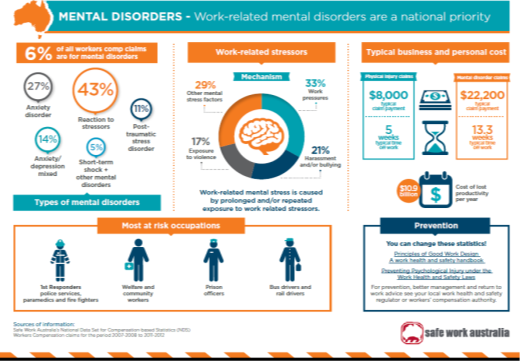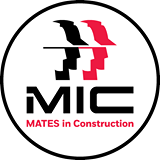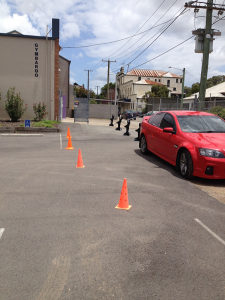Organisations benefit from implementing voluntary health and wellbeing promotion programs for a number of reasons including:
- Gains workers trust and loyalty because the workers will feel the business actually cares about them when their personal well-being is cared for by the business. The programs may be seen as going above and beyond.
- Assists workers in dealing with issues both at work as well as at home, which in turn improves Work Health and Safety / reduces the number of injuries sustained at work. That is, drug and alcohol dependence, anxiety and depression, familial issues, mental disorders etc can all impact work life and potentially the lives of others overall (e.g., may lead to distractions and being able to focus at work, impaired whilst at work etc).
- Improves workers general health and therefore improved performance at work and fewer days off sick or away from work. $10.9 billion dollars is lost in productivity each year for mental health claims (according to statistics from Safe Work Australia – see stats page below).

- Reduces the number and overall cost of Workers Compensation Claims. For example, business and personal cost of a mental disorder claim is substantially greater than physical injury claims with $14,200 more in cost and 8.3 weeks more typical time off work – that is, a typical mental disorder claim costs $22,200 per typical claim payment and 13.3 weeks off work.
Some  sample health and well-being promotions are as follows (certainly not an exhaustive list):
sample health and well-being promotions are as follows (certainly not an exhaustive list):
- Mates in Construction – MIC (suicide awareness and prevention program) – provision of not only awareness training, but training for mates on the jobsite in recognition of warning signs or symptoms of depression and what to do. Given that suicide rates in the construction industry are 25% higher than the Australian population, a program definitely to consider. Construction workers and their families can contact the Mates in Construction hotline 24 hours a day, seven days a week on 1300 642 111
- Nutritional Assessment – provide your workers with the opportunity to have a Nutritionalist conduct an assessment and provide feedback based on a diary.
- Employee Assistance Program (EAP) – providing a confidential, anonymous opportunity for assistance when needed – involve the Health & Safety Committee in the initial stages of the implementation of the EAP, including methods for disseminating the initiative and selection of the appropriate provider. Workers should also be consulted with on the program via toolbox talks, inductions etc.
- Driveway Safety Demonstrations – show your workers you care about their safety and their families’ safety at home by using a driveway safety demonstration to prevent injury and death to children at home in their driveways, using child size statues. This is an excellent initiative by Kids and Traffic Early Childhood Road Safety Education Program – http://www.kidsandtraffic.mq.edu.au/ Here’s a sample done for the mothers at Gymbaroo Maitland:

Contact us at Red Insight if you would like assistance implementing programs or in brainstorming ideas that suit your organisation.
